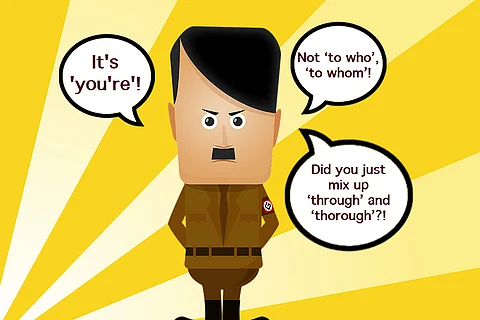

I love English as a language. I’m much more comfortable reading, writing, and expressing myself in a formal setting in English than in Hindi, which is the only other language I read and write fluently.
But, English is not my first language. It is unlikely that it is the first language of anyone born to Indian parents, in India.
And yet, until a few years ago, I prided myself on being the Upholder of Grammar, the Keeper of Punctuation and the Corrector of Wrongly Placed Apostrophes. In short, I was, what we colloquially call, a ‘Grammar Nazi’.
But then, I stopped. Don’t get me wrong, I still appreciate the correct usage of ‘you’re’ and ‘your’. But I’ve stopped correcting people unless they ask me if their usage is wrong. Here’s why you should too.
Colonial hangover
While pursuing my Bachelor’s degree from Delhi University, I noticed how the same classmates who were shy in class were actually some of the most knowledgeable ones. You could opt to write exams and assignments either in Hindi or in English, based on your preference. And so, I learnt that the only reason they were quiet in class is that they, like many others, had internalised that their lack of fluency in English somehow undermined their intelligence.
I also noticed how the ‘cool kids’ would be the English speakers and would hardly mingle with the Hindi speakers. When the former spoke Hindi or Hinglish, it was fine, but when the latter tried to talk in English with accented pronunciations, it was the butt of a joke.
Let’s get this straight – English is NOT a language native to India, but one that came with the British. Not everyone gets an education where the medium of instruction is English, and that does not automatically make them poor. Even if they have English as a subject, it is not necessary for them to excel in it to beat you in a debate.
So really, laughing at someone who speaks broken English just makes you look ignorant.
Not everyone needs to know English
Fact 1 – We do not have a national language.
Fact 2 – That does not make English the de facto language of communication across India.
Yes, India is very diverse, colourful and many other things, but the social studies book-induced pride stays intact only till you put an ‘educated’, ‘well spoken’ Indian into another city where not every cab driver speaks English.
“They only know Kannada and speak very broken English. Imagine, they don’t know Hindi only!” some of my acquaintances tell me when they come to Bengaluru, as I struggle to not roll my eyes.
But riddle me this – When you do not expect a Parisian to speak to you in Hindi or even English for that matter, why the partiality against your Tamil or Kannada cabbie? And when he/she can easily get by knowing the local language, why should he/she be required to speak fluent English?
Perhaps, it would help if you made an effort to learn the local salutations and phrases when you are in a new place. You know, just like how you pride yourself in having learnt how to say “Bonjour” and “au revoir” before or after your Paris trip.
Accented English ≠ Wrong English
Over the years, I’ve noticed how comic relief in many performances and films revolved around accented pronunciations. Obviously, that’s a reflection of the real-life snickering around that kid saying who loves going to the ‘bich’ (beach) and that colleague who has to catch the ‘baas’ (bus).
But guess what, they probably know a language that you don’t. The reason behind their misplaced grammar is probably that they’re used to the grammar and emphasis on certain syllables in another language.
As for the accent, why does everyone have to speak in one boring, monotonous accent while speaking in English anyway? Pronunciation with an accent is NOT necessarily incorrect pronunciation.
Are you able to understand what they are saying? Yes? Good. Converse, move on. No? Politely ask them if they could repeat themselves or what they meant, just like you would to a fellow ‘correct’ English speaker.
You’re priding yourself on being a ‘nazi’… voluntarily
In case you missed your history lesson, Adolf Hitler was a Nazi. He and his followers were responsible for ostracization and genocide of millions of Jews in Germany during World War II. He was also responsible for starting a war that took the lives of 40 million Europeans.
If you call yourself a Grammar Nazi, you’re essentially equating your intolerance of incorrect grammar usage to the intolerance the Nazis had for an entire population, which resulted in the death of millions. It doesn’t matter if you’re only joking ya, because it's still disrespectful.
If that doesn’t make you uncomfortable, I don’t know what will.
Views expressed are personal opinions of the author.